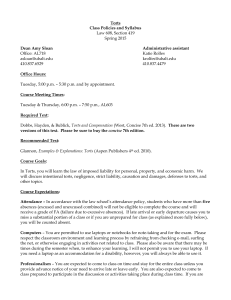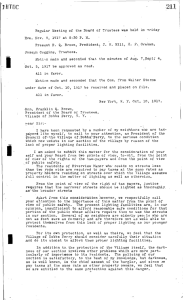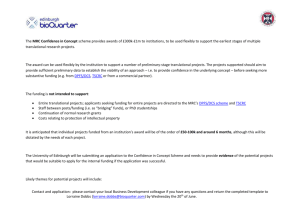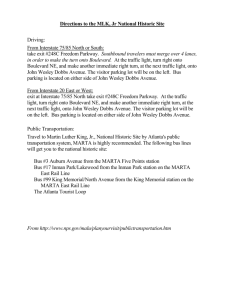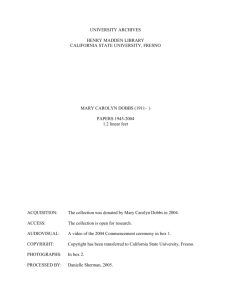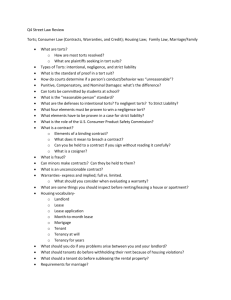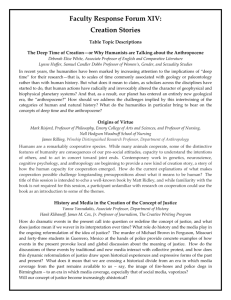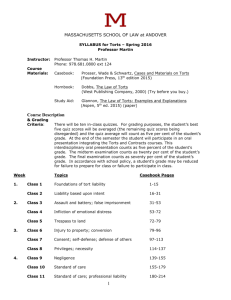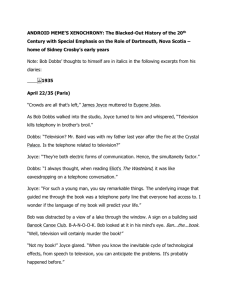Torts Class Policies and Syllabus Law 608, Section 319G Spring
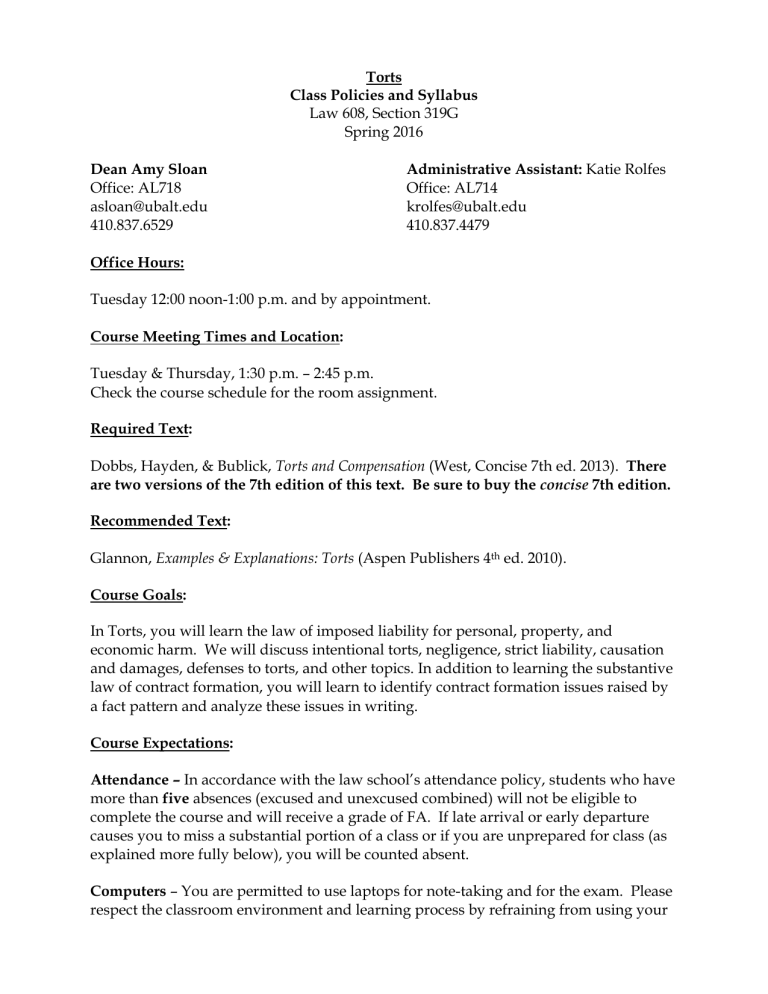
Torts
Class Policies and Syllabus
Law 608, Section 319G
Spring 2016
Dean
AL718 Office:
410.837.6529
Office Hours:
Tuesday 12:00 noon-1:00 p.m. and by appointment.
Course Meeting Times and Location:
Tuesday & Thursday, 1:30 p.m. – 2:45 p.m.
Check the course schedule for the room assignment.
Required Text:
Dobbs, Hayden, & Bublick, Torts and Compensation (West, Concise 7th ed. 2013). There are two versions of the 7th edition of this text. Be sure to buy the concise 7th edition.
Recommended Text:
Glannon, Examples & Explanations: Torts (Aspen Publishers 4 th ed. 2010).
Course Goals:
In Torts, you will learn the law of imposed liability for personal, property, and economic harm. We will discuss intentional torts, negligence, strict liability, causation and damages, defenses to torts, and other topics. In addition to learning the substantive law of contract formation, you will learn to identify contract formation issues raised by a fact pattern and analyze these issues in writing.
Course Expectations:
Attendance – In accordance with the law school’s attendance policy, students who have more than five absences (excused and unexcused combined) will not be eligible to complete the course and will receive a grade of FA. If late arrival or early departure causes you to miss a substantial portion of a class or if you are unprepared for class (as explained more fully below), you will be counted absent.
Computers – You are permitted to use laptops for note-taking and for the exam. Please respect the classroom environment and learning process by refraining from using your
laptop to check e-mail, surf the net, or otherwise engage in activities not related to class.
Please also be aware that there may be times during the semester when, to enhance your learning, I will not permit you to use your laptop. If you need a laptop as an accommodation for a disability, however, you will always be able to use it.
Professionalism – You are expected to come to class on time and stay for the entire class unless you provide advance notice of your need to arrive late or leave early. You are also expected to come to class prepared to participate in the discussion or activities taking place during class time. If you are unprepared, please give me a note to that effect before class begins. If I call on you and you are not prepared and have not given me a note, you will be counted absent for that class period. Please be aware that being unprepared for class may negatively affect your final grade (as explained more fully below). In addition, please turn off your cell phone before class begins.
TWEN – I will create a TWEN page for our class. You need a Westlaw password to access the TWEN page. I will communicate with the class through the TWEN page, and you are expected to check the site regularly for class announcements and course materials.
Methods of Evaluation:
Your grade in this class will be based on class participation (10%) and the final examination at the end of the semester (90%).
Syllabus:
The outline below sets out the topics we will cover and anticipated reading assignments. Assignments may be adjusted from time to time depending on our progress through the material. Assigned reading material that is not in the case book will be posted on TWEN. All reading is to be completed before class.
Jan. 12: Introduction; the Concept of Fault
Class Policies and Syllabus; Dobbs 3-11; 19-29 ( Van Camp v. McAfoos )
Jan. 14: Battery; Defining Intent
Dobbs 30-39 ( Snyder v. Turk ; Cohen v. Smith ; Garrett v. Dailey )
Jan. 19:
Jan. 21:
Jan. 26:
Intent (cont’d); Assault
Dobbs 44-50 ( Baska v. Sherzer ; Cullison v. Medley )
Property Torts
Dobbs 53-59
Defenses to Intentional Torts
Dobbs 63-70 ( Touchet v. Hampton ; Katko v. Briney ; Brown v. Martinez )
2
Jan. 28: Defenses to Intentional Torts (cont’d)
Dobbs 79-80; 81; 82-85 ( Kaplan v. Mamelak ; Surocco v. Geary ; Ploof v.
Putnam )
Feb. 2:
Feb. 4:
Intentional Torts Practice Problem; Introduction to Negligence
Dobbs 91-93
Duty: General Duty of Care
Dobbs 93-95; 98-103 ( Stewart v. Motts ; Shepard v. Gardner Wholesale ; Creasy v. Rusk )
Feb. 9:
Feb. 11:
General Duty of Care (cont’d); Statutory Standards of Care
Dobbs 104-108; 110-117 ( Hill v. Sparks ; Robinson v. Lindsay ; Martin v.
Herzog ; O’Guin v. Bingham County )
Breach of Duty: Assessing Foreseeable Risks and Costs; Unstructured
Weighing of Risks & Costs
Dobbs 121; 123-129 ( Pipher v. Parsell ; Indiana Consolidated Insurance v.
Mathew s)
Feb. 16:
Feb. 18:
Feb. 23:
Breach of Duty (cont’d): Risk/Utility
Dobbs 137-142 ( U.S. v. Carroll Towing )
Breach of Duty (cont’d): Multiple Tortfeasors
Dobbs 133-134; 142-146 (read the facts only of Bernier v. Boston Edison )
Breach of Duty (cont’d): Custom; Res Ipsa Loquitur
Dobbs 157-161; 162-167 ( Duncan v. Corbetta ; The T.J. Hooper ; Byrne v. Boadle )
Feb. 25: Actual Harm; Factual Cause: The But-For Test
Dobbs 177-186 ( Right v. Breen ; Hale v. Ostrow ; Salinetro v. Nystrom ; Multiple
Causes and Apportionment)
March 1: Factual Cause (cont’d): Alternatives to But-For Causation; Proof of
Causation
Dobbs 188-194 ( Lasey v. Combined Transport ; Summers v. Tice )
March 3: Proximate Cause: Scope of the Risk
Dobbs 203-209 ( Thompson v. Kaczinski ; Abrams v. City of Chicago )
March 8: Proximate Cause (cont’d): Scope of Risk; Assessing the Scope of Risk
Dobbs 209-221 ( Palsgraf v. Long Island Railroad ; Hughes v. Lord Advocate ;
Doughty v. Turner Manufacturing through note 2)
3
March 10: Proximate Cause (cont’d): Assessing Scope of Risk; Intervening Causes
Dobbs 221-223; 226-227; 230-233; 235-238 ( Hammerstein v. Jean Development
West ; SKIP the Marcus & Collins cases, but READ notes 4-7 following those cases; Derdiarian v. Felix Contracting ; Marshall v. Nugent )
March 15 & 17: No Class – Spring Break
March 22: Defenses to Negligence: Contributory & Comparative Negligence
Dobbs 241-246; 265-268 ( Butterfield v. Forrester ; Barker v. Kallash )
March 24: Defenses to Negligence: Assumption of Risk
Dobbs 269-271; 275-282 ( Stelluti v. Casapenn Enterprises ; Tunkl v. Regents ;
Betts v. Crawford ; Sunday v. Stratton ; Avlia v. Citrus Community College
District ).
March 29: Negligence Practice Problem
March 31: Duties of Landowners
Dobbs 297; 301-307; 323-325 ( Gladon v. Greater Cleveland Regional Transit
Authority ; Scurti v. City of New York )
April 5: Duties of Medical and Other Professionals
Dobbs 329-340 ( Walski v. Tiesenga ; Vergara v. Doan )
April 7: Nonfeasance; Duty to Protect from Third Persons
Dobbs 399-406; 439-443 ( Estate of Cilley v. Lane ; Posecai v. Wal-Mart Stores )
April 12: Duty to Protect from Third Persons (cont’d); Wrongful Death
Dobbs 453-458; 485-487; 507-508; 511-514 ( Tarasoff v. Regents ; Wrongful
Death chapter - SKIP Weigel , but read the introductory material at the beginning of the chapter and the notes following the case)
April 14: Vicarious Liability
526-530; 533-539 (
April 19: TBA
Edgewater Motels, Inc. v. Gatzke ; Mavrikidis v. Petullo )
April 21: Review Session
Review all notes.
4
